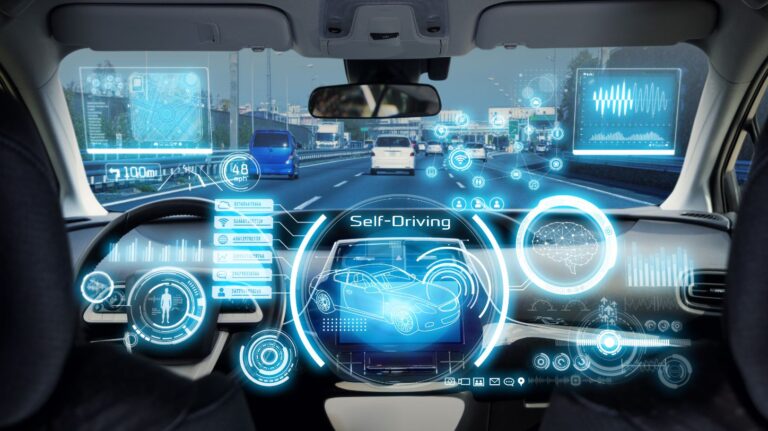Legislation signalling the first step to the commercial deployment of autonomous vehicles (AVs) on UK roads has been announced as part of the King’s speech today [7 November 2023].
In a briefing document from Number 10, the government said the Automated Vehicles Bill will unlock a “transport revolution” by enabling the safe deployment of self-driving vehicles.
It said the bill will also cement the UK’s position as a “global leader” in a high-tech and high-growth industry and deliver one of the world’s “most comprehensive legal frameworks” for self-driving vehicles, with safety at its core.
The document argues that the new legislation will release the huge growth potential of the sector, which will allow the UK to create a market of up to £42bn and create 38,000 skilled jobs by 2035.
The report said: “Self-driving vehicles will make transport safer, more convenient and more accessible, improving the lives of millions of people.
“With 88% of accidents currently involving human error, the potential for AVs to reduce costs, injuries, and fatalities is enormous.
“They will empower people across the country to get around more easily, including to school or work which will boost productivity.”
MPs on the Transport Committee will likely welcome the announcement of new laws to govern self-driving technologies after calling for new legislation to tackle safety concerns in September.
It made series of recommendations on how the government should approach their introduction to the UK’s roads in its report on the future of self-driving vehicles.
Read more: New project set to roll out autonomous e-shuttles in Belfast by 2025
Commenting on the announcement of the UK Automated Vehicles Bill during the State Opening of Parliament by HRH King Charles III today, Professor Paul Newman CBE, president, CTO and co-founder at British autonomous vehicle software company Oxa, said: “Self-driving vehicles are an outstanding example of AI’s ability to deliver strong societal, net-zero, economic and industrial benefits.
“Our cities are changing as are our modes of transport, forms of vehicle ownership and emissions expectations.
“But what never changes is our intolerance of harm and injury caused by inevitable, regrettable and soon to be avoidable road accidents.
“The new UK Automated Vehicles Bill accelerates the former and preserves the latter.”
Sarah Gates, director of public policy at Wayve, a London-based AI start-up developing self-driving technology and finalist at CiTTi Awards 2023, said: “The confirmation today that the government will bring forward self-driving legislation in this session of parliament is an incredibly important milestone for Wayve and the entire self-driving industry.
“The new Automated Vehicles Bill will enact a comprehensive liability framework for the safe deployment of self-driving vehicles, including crucial protection for consumers.”
READ MORE: Asda and Wayve announce ‘UK’s largest’ autonomous grocery delivery pilot
According to the government, 70% of global automotive-sector companies that source for self-driving technologies are doing so from the UK.
Between 2018 and 2022, the UK self-driving vehicle sector has reportedly generated £475m of direct investment and 1,500 new jobs.
“We can either lead the way or follow the leaders,” said the report. “This legislation would be one of the world’s most comprehensive legal frameworks for self-driving vehicles, based on the international thought-leadership of the Law Commissions’ review.
“The bill will provide the certainty and confidence that the private sector needs to unlock research, innovation, and investment across the whole of the UK.”
It argues that the UK needs to update its laws to ensure the potential benefits of self-driving technologies can become a reality.
Read more: Autonomous mobility could deliver £66bn to UK by 2040, says SMMT
However, it stresses that safety and the protection of the user will be at the heart of its new regime and it will make sure that only the driver – be it the vehicle or person – is accountable, by clarifying and updating the law.
It will thus implement the recommendations of the four-year review of self-driving vehicle legislation carried out by the Law Commission of England and Wales and the Scottish Law Commission.
It will also set a “rigorous safety framework” for self-driving vehicles, with safety at its core and set the threshold for self-driving vehicles in law.
Only vehicles that can drive themselves safely and can follow all road traffic rules without the need for a human to monitor or control the vehicle to maintain that level of safety will be classified as self-driving and allowed on UK roads.
Furthermore, it says that the Department for Transport (DfT) and its agencies will be given new powers to authorise these vehicles and ensure in-use compliance with the safety standards that the government will set.
It will also hold companies accountable once vehicles are on roads. Companies will have to meet safety requirements from the point a vehicle is introduced on to UK roads or face new sanctions and penalties if they fail in their duty.
These will include fines, requirements to take corrective action, and suspension of operation. Criminal offences will apply in serious cases.
The bill also sets out new processes to investigate incidents involving self-driving vehicles to ensure that lessons are fed back into the safety framework.
Meanwhile, it aims to digitalise traffic regulation orders. Local authorities will be required to send the legal orders they make – for example, to set speed limits, close roads and designate parking bays – to a central publication platform.
This data will be used to create a digital map of the road network to support the safe operation of self-driving vehicles, which ministers say will also help make parking easier for all drivers, providing better information like the location and availability of parking spaces, as outlined in the Plan for Drivers, published last month [October].
Read more: Solihull Council receives £300,000 for autonomous transport project
The bill aims to ensure clear legal liability and will create new organisations responsible for self-driving.
While the vehicle is driving itself, a company rather than an individual will be responsible for the way it drives.
The bill will set out the responsibilities of companies that develop and operate self-driving vehicles on roads in Great Britain.
Once authorised, companies will have ongoing obligations to keep their vehicles safe and ensure that they continue to drive in accordance with British laws.
They will be required to report certain safety related data to the authorisation authority and the in-use regulator and to comply with other relevant laws, including data protection and environmental protection legislation.
They will also protect users from being unfairly held accountable. The bill gives people immunity from prosecution when a self-driving vehicle is driving itself, given it does not make sense to then hold the person sat behind the wheel responsible.
Non-driving responsibilities, however, will still remain with that person, such as maintaining appropriate insurance for the vehicle and ensuring proper loading, as well as responsibility during any part of the journey where the person is driving.
The latest development in robotics and automated technologies will be on show at the Robotics and Automation Exhibition, which will be held on 19-20 March 2024 at the NEC Birmingham. Register now to attend the UK’s biggest exhibition dedicated to robotics and automation.








